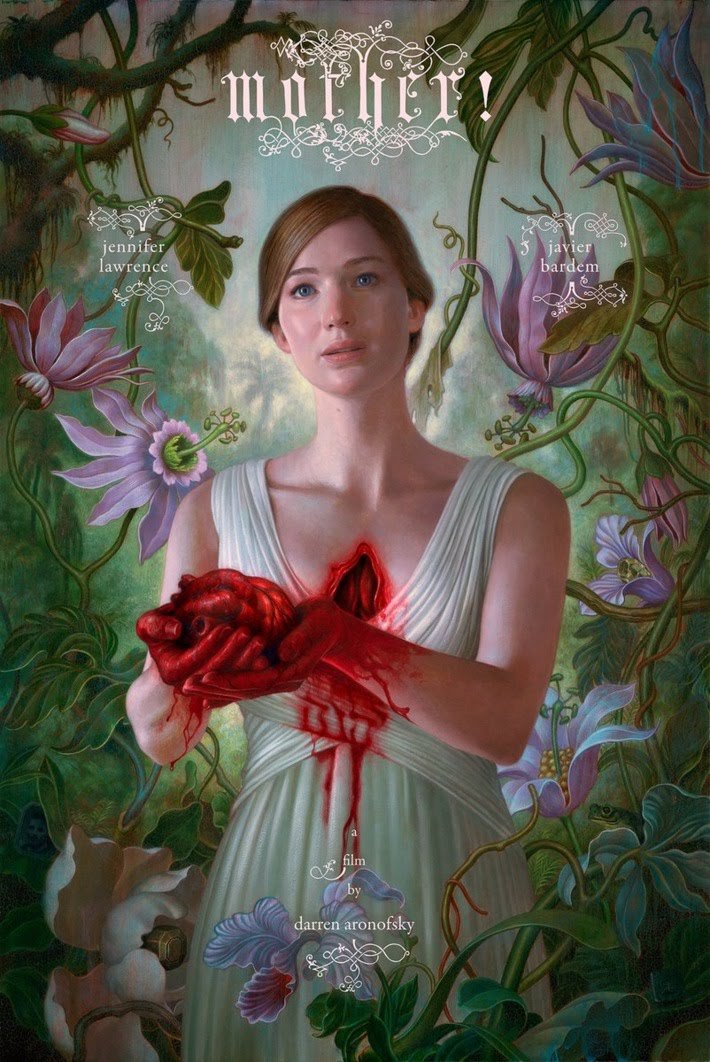After months of speculation, the secretive film crash-landed in theatres with an “F” Cinemascore and an underwhelming opening weekend of $7.5 million. Paramount’s $30 million psychological fantasy picture polarized audiences and prompted walkouts. It joins only twelve others in history with the same score and general divisiveness. Even critics are puzzled, many call it a masterpiece, but some think it’s trash. It is definitely the boldest release from a major studio in decades, a love-it-or-hate-it piece of capital “A” art that is pretentious and controversial, but more importantly thought-provoking.
From the first frame, ‘mother!’ (the title is more than earned) exists on an allegorical level within a heightened reality. In a country paradise, newlyweds live a harmonious life together in an octagonal Victorian mansion. After a fire that ruined his place, the successful poet husband (Javier Bardem) experiences a severe form of writer’s block. His wife (Jennifer Lawrence) is a homemaker who cares deeply about the restoration of their secluded home.
One day, a man (Ed Harris, comically bizarre) who works at the local hospital comes knocking at the door thinking it is a bed and breakfast. Much to Lawrence’s character’s distress, the man’s wife (Michelle Pfeiffer, a snake) shows up a day later. She can not understand why her husband has let these people invade her home or why he is so entertained by the man’s company. Pfeiffer’s savage resurgence in cinema is more than welcomed as her character makes herself at home, insinuating about matters concerning the woman’s marriage and condescending to her idealism. The couple’s two sons (Domhnall Gleeson and Brian Gleeson) arrive after that and really get the biblical horror ball rolling. Depending on what the viewer has caught onto at this point, they may be checking where the exit signs are.
Even though it’s impossible to spoil, this is where revealing any more of the film’s plot will weaken its viewing experience. As a part of its cryptic marketing, the posters and trailer depicts Bardem’s character as a judeo-christian god-type to Lawrence’s mother nature. A statement about humankind’s historical treatment of Earth is at the crux of the film. One thing is certain, the film and everything within it revolves around its mother. We see Jennifer Lawrence’s face as an almost ideal image as she is put through the wringer in her most challenging role to date. The characters are given no names, she plays an icon who makes the agony of her burdens and descent into mania a searing transformation.
With that being said, whoever gets off the thrill ride at this point is mere minutes away from a trip down the rabbit hole that builds to a shockingly chaotic sequence. Writer-director Darren Aronofsky is weaving together a multitude of themes, motifs, and symbols here. His handheld 16mm camera puts the viewer in mother’s perspective for two hours, with 66 minutes being close-ups of Lawrence and the rest over-the-shoulder and point-of-view angles. He zigzags his way through the house and maintains spatial orientation even in some highly complicated scenes. In terms of what is in the shot, he uses color as an instrument like any painter would, introducing deep blues and vivid reds as the story progresses to make for unforgettable imagery. A meticulous soundscape, audiences will not hear any music in the movie because the director and former composer Jóhann Jóhannsson (“The Theory of Everything,” “Arrival”) mutually agreed that it was interfering with the total mystery aspect of it. Some may find the camerawork claustrophobic and the lack of a score tedious, but they do a service to the overall product.
The film unfolds like a stream of consciousness and carries a sense of urgency with its timely message. Its screenplay supposedly poured out of Aronofsky in 5 days, drawing inspiration from masterminds like Roman Polanski (“Rosemary’s Baby”) and Stanley Kubrick, keeping in line with his signature paranoia-driven pictures. With varying success, his latest is the most hyperbolic, but the frightening hallucinatory aspects should come as no surprise to anyone familiar with his work. A romantic chamber drama turned home invasion flick, the latter half makes the former an excellent black comedy, a genre the director should consider exploring next. It also has one of the best cameos in recent memory, Kristen Wiig like you have never seen her before.
This auteur director and leading actress team-up (they’re dating in real life too, paralleling other potential interpretations about fame, artistic muses and toxic masculinity) is a theatre experience unlike any other. Its audacious with all the subtlety of a slingblade in some departments and it’s sure to leave each and every viewer with a hot take on its metaphorical meaning. The worst case scenario is audiences reject the film and dismiss it as a bombastic mess. The best case is that they really do want the originality they ask for and that word-of-mouth will kickstart a slow-burning success. Either way, “Requiem for a Dream” depicted the devastating reality of addiction, “Black Swan” was a poignant ballerina’s mind-bender, and his latest is humanity’s violent assault on the environment. Mainstream moviegoers, dare to see “mother!”
Four out of five stars
JESSE BAALMAN
jbaalman@lc.edu




